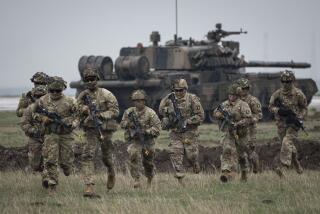Advance Troops OKd for Balkans
- Share via
SKOPJE, Macedonia — NATO members agreed Wednesday to send an advance team of 400 soldiers to Macedonia to lay the groundwork for a larger force that will carry out the alliance’s mission of disarming ethnic Albanian rebels.
The vanguard team of British soldiers will arrive by the weekend to organize the operation so that, once the alliance gives the go-ahead, the rest of the 3,500-member force can be rapidly deployed.
“Things are moving quickly. It’s been very positive since the signature of the agreement,” said North Atlantic Treaty Organization spokesman Yves Brodeur, referring to a peace accord signed Monday. “Lots of things have happened, and we are encouraged by what has happened so far.”
It is the alliance’s third land-based mission in the Balkans. The other two, in Bosnia-Herzegovina and in Kosovo, a province of Serbia, the main Yugoslav republic, are ongoing.
In Washington, State Department spokesman Philip T. Reeker said that only a few hundred U.S. soldiers will participate in the operation, providing command, communications, medical and logistical support. The Americans will be drawn from units in Kosovo and those who have already been deployed in Macedonia to support the Kosovo peacekeepers, he said.
The entry of NATO troops will mark a crucial point in the effort by European countries and the United States to secure lasting peace in Macedonia.
For the last six months, an uprising by ethnic Albanian guerrillas has brought the country to the brink of civil war. The rebels say they are fighting for equal rights for the ethnic Albanian minority, though Macedonian officials fear that the guerrillas are seeking to carve out a separate ethnic Albanian state.
U.S. and European Union officials helped mediate the accord that was signed Monday. The pact is designed to augment the rights of ethnic Albanians, who make up at least 25% of Macedonia’s 2 million people. A cease-fire, reached over the weekend but still shaky, also was a key element in securing a commitment by NATO to disarm the rebels.
Alliance officials delayed a decision on committing the bulk of their force until they see whether the cease-fire holds. They are expected to take up the issue Friday or early next week.
On Wednesday, the Macedonian government formally approved the deployment of NATO troops, and President Boris Trajkovski asked parliament to take the first steps toward amending the constitution to give ethnic Albanians rights in line with the peace accord. The parliament is expected to change the constitution within 45 days.
“The government made a decision approving the deployment of NATO forces . . . in order to disarm groups of ethnic Albanian extremists,” said a statement from Trajkovski’s office.
As important, the government this week agreed to offer an amnesty to the guerrillas. The amnesty was a condition that the rebel National Liberation Army imposed before agreeing to hand over its weapons.
Under the amnesty offer, rebels who hand in their arms during the 30-day period in which NATO troops are collecting weapons will not be prosecuted as long as they do not take up the fight again.
The rebels agreed to the voluntary disarmament in a letter to NATO mediators signed by Ali Ahmeti, the NLA political leader, according to Maj. Barry Johnson, a NATO spokesman.
NATO’s Macedonia mission is designed to be far shorter than its involvement in other Balkan countries, with a set limit of about 60 days. It is expected that the troops will take 15 days to set up the disarmament operation, spend 30 days carrying it out and another 15 days withdrawing from the country.
However, Western deployments elsewhere in the Balkans have run longer than predicted.
The exact terms of the NATO mission are still being worked out. There are indications that the alliance expects to collect about 3,000 weapons, but Macedonian officials are pushing for more. It is not known how much weaponry the guerrillas possess, but there may be as many as 6,000 rebels.
Under the plan, NATO is to set up collection points around Macedonia where guerrillas will voluntarily bring guns, mortars and ammunition. The alliance will destroy the stockpiles in another country, Johnson said.
The rapid developments came after weeks of painstaking negotiations in which international mediators often were unsure whether Macedonia’s political leaders really wanted a peace accord. As recently as Monday, there were concerns that it would be difficult for the government to sign an amnesty agreement.
“The reality was you had some very hard-line politicians who wanted to play to a hard-line gallery, and that’s the concern,” said a Western official who requested anonymity, “but what’s happened is that a momentum has been generated, and there’s an air of inevitability.”
Because of distrust between ethnic Macedonians and ethnic Albanians, it was seen as critical to have a neutral party undertake the disarmament.
There were conflicting views late Wednesday about whether the government and NATO had the same understanding of the disarmament process. Government ministers are worried about the appearance of the new and more radical Albanian National Army, which has not committed itself to disarming.
Foreign Minister Ilinka Mitreva said NATO had agreed to disarm “extremist ethnic Albanian armed groups,” and she added, “This is wide-ranging phrasing, and this is part of NATO’s task.”
However, alliance Maj. Gen. Gunnar Lange said at a news conference Wednesday that NATO is committed to disarming only the National Liberation Army, with which it has had extensive negotiations.
“We will be collecting arms and ammunition which belong . . . to the so-called NLA organization. So all of the organizations that are not under control by the so-called NLA organization have to be dealt with by the [Macedonian] authorities, the [Macedonian] security forces.”
(BEGIN TEXT OF INFOBOX / INFOGRAPHIC)
Western Intervention in Balkans
Jan. 3, 1992 - United Nations brokers cease-fire between the Croatian government and rebel Serbs.
July 1992 - NATO agrees to use naval force in Adriatic to monitor compliance with U.N. sanctions imposed on Yugoslavia.
April 1993 - NATO begins combat patrols with fighter jets over Bosnia-Herzegovina to enforce compliance with U.N. ban on flights.
February 1994 - U.S. fighter jets shoot down four Serbian aircraft that violate U.N. ban on flights over Bosnia.
Dec. 19, 1995 - NATO-led Implementation Force (IFOR) begins deployment in Bosnia to put into effect a peace agreement negotiated in Dayton, Ohio.
Dec. 20, 1996 - The NATO-led Stabilization Force (SFOR) is set up to secure peace in Bosnia, replacing IFOR.
March 24, 1999 - Seeking to protect ethnic Albanians in the Serbian province of Kosovo, NATO launches airstrikes against Yugoslavia, of which Serbia is the main republic.
June 10, 1999 - NATO suspends its bombing campaign after Yugoslav forces begin to withdraw from Kosovo, and thousands of NATO-led peacekeepers enter the province to enforce peace and the establishment of U.N. administration.
Aug. 15, 2001 - NATO ambassadors agree to send about 400 soldiers to Macedonia to pave the way for deploying about 3,500 troops to collect weapons from ethnic Albanian rebels.
Source: Reuters
More to Read
Sign up for Essential California
The most important California stories and recommendations in your inbox every morning.
You may occasionally receive promotional content from the Los Angeles Times.










